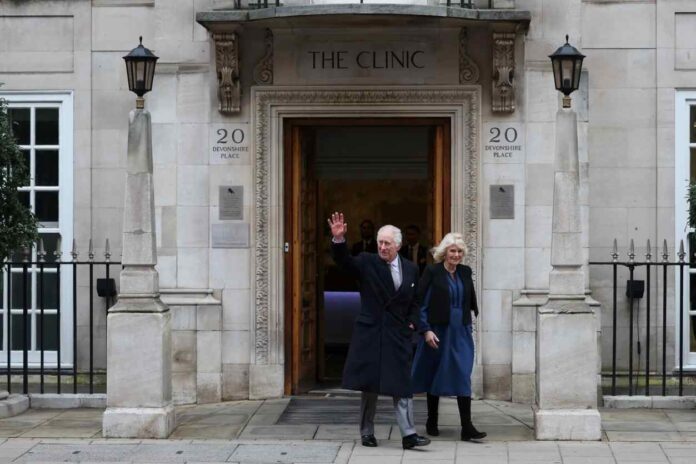King Charles III has been diagnosed with cancer, leading him to halt his public duties for treatment, marking a somber turn in his relatively brief reign of just over a year and a half.
The news was conveyed by Buckingham Palace on Monday night, closely following the monarch’s recent hospital discharge after addressing an enlarged prostate.
Although the specific type of cancer has not been disclosed by the palace, officials have clarified that it differs from prostate cancer, which was not the initial concern during the recent medical intervention.
“During the king’s recent hospital procedure for benign prostate enlargement, a separate issue of concern was noted,” the palace said in a four-paragraph statement,”
“Subsequent diagnostic tests have identified a form of cancer. His Majesty has today commenced a schedule of regular treatments, during which time he has been advised by doctors to postpone public-facing duties.”
According to palace officials, the king will maintain his other responsibilities, such as his regular meetings with the prime minister and the daily administrative tasks inherent to his role as Britain’s head of state.
The palace emphasised that Charles maintains an optimistic outlook regarding his treatment and eagerly anticipates resuming his public engagements. He has relocated from his country estate, Sandringham, to London to commence outpatient treatment, as confirmed by palace authorities.
Charles, who assumed the throne in September 2022 following the passing of his mother, Queen Elizabeth II, has historically experienced robust health.
While he battled recurring tonsillitis during childhood, his adult life has been characterized by an active lifestyle involving pursuits such as hiking, polo, and skiing.
The openness regarding his prostate treatment and subsequent cancer diagnosis marks a departure from the typical discretion maintained by the royal family concerning their health matters.
This disclosure stands out particularly in contrast to the minimal information provided about the health conditions of royal members. For instance, following Queen Elizabeth II’s demise at the age of 96, the palace merely attributed her passing to “old age” on her death certificate.
The Duchess of York, Sarah Ferguson, has also gone public about her health battles after undergoing surgery for breast cancer in 2023, she is now being treated for skin cancer.
The Duchess said on social media, “I have been diagnosed with malignant melanoma, a form of skin cancer, my second cancer diagnosis within a year after I was diagnosed with breast cancer this summer and underwent a mastectomy and reconstructive surgery,”
“I believe my experience underlines the importance of checking the size, shape, colour and texture, and emergence of new moles that can be a sign of melanoma, and urge anyone who is reading this to be diligent.”
Approximately 80% of males aged 70 and above are reported to have an enlarged prostate, as stated by the Prostate Cancer Foundation of Australia. This condition is alternatively referred to as benign prostate hypertrophy.
According to the Cancer Council, prostate cancer affects roughly 17,000 Australian men annually, with its likelihood escalating with age. Symptoms encompass challenges or discomfort during urination.



